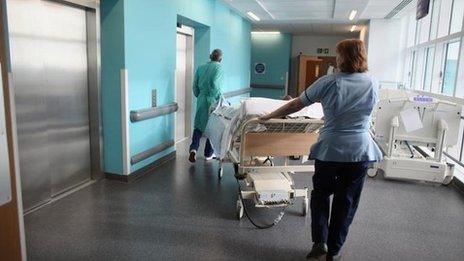Scotland's A&E waiting times worst since monitoring began
- Published

During March, 92 people spent more than 12 hours waiting in A&E to be treated
People are waiting longer than ever in Scottish accident and emergency departments, according to new figures.
In January of this year, one in 10 patients waited longer than four hours to be treated - the worst record since monitoring began in 2007.
Only four out of 14 health boards met the government's target of treating 98% of patients within four hours.
The Scottish government has announced it is investing £50m in an action plan to improve waiting times.
Figures for the last six months have shown the highest number of people waiting more than four hours in A&E since 2007.
NHS Lanarkshire had the worst performance, with 11.3% of people not seen within four hours.
The figures also showed that during March, across Scotland, 92 people spent more than 12 hours waiting in A&E to be treated - although this figure was down from 323 people for December 2012.
The government says it is setting up a task force to oversee the £50m plan to improve the emergency care within hospitals.
Busy winter
Health Secretary Alex Neil said: "There is no doubt that pressure on our A&E departments is a pressing issue.
"We have seen a busy winter and, as we continue to deal with the demands of an ageing population, we are seeing an increase in admissions, adding even more pressure on doctors and nurses who are doing an outstanding job."
He said the action plan would look at how staff work so that people can leave hospital as soon as they are ready.
It also aims to improve links to other areas of healthcare so that people could be treated in the community if possible.
Mr Ian Ritchie, president of the Royal College of Surgeons of Edinburgh said: "I am particularly pleased to see the emphasis is not just on the front door but also on what happens to patients once their emergency condition has been dealt with, and is moving on to what happens to them in the community."
Scottish Labour health spokeswoman Jackie Baillie hit out at missed A&E targets.
She said: "The SNP's only solution so far has been to downgrade targets, but even their revised numbers would not be achieved based on these latest figures.
"This is no way to run a health service. If targets are not achieved they cannot simply be revised, action must be undertaken to tackle the problem."
Members of the Royal Colleges, GPs and chief executives from NHS Tayside, Grampian and the Scottish Ambulance Service are among those appointed to the task force to tackle the issue.
NHS Glasgow's director of surgery and anaesthesia, Jim Crombie, has been placed in charge of the task force.
Glasgow has consistently been one of boards with lowest waiting times.
- Published9 May 2013
- Published6 March 2013
- Published27 February 2013
- Published26 February 2013
- Published21 January 2013